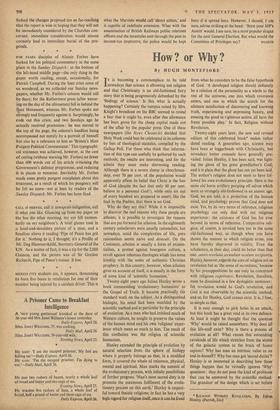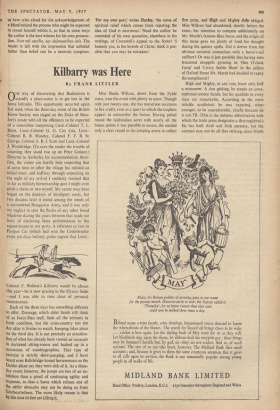How ? or Why ?
By HUGH MONTEFIORE TT is becoming a commonplace to be told nowadays that science is elbowing out religion and that Christianity is an old-fashioned fairy story that is being progressively debunked by the 'findings of science.' Is this what is actually happening? Certainly the rumpus raised by Mrs. Knight's broadcast on the BBC seemed to reveal a fear that it might be, even after due allowance has been given for the cheap capital made out of the affair by the popular press. One of these newspapers (the News Chronicle) decided that Holy Week could best be celebrated in its columns by lists of theological statistics, compiled by the Gallup Poll. For those who think that informa- tion of this type can usefully be gathered by such methods, the results are interesting, and for the atheist they must make distressing reading. Although there is a severe slump in churchman- ship, over 70 per cent. of the population would apparently affirm its belief that Christ is the Son of God (despite the fact that only 40 per cent. believe in a personal God!), while only six out of every hundred are prepared to assert, like the fool in the Psalms, that there is no God.
Why do they say this? While it is impossible to discover the real reasons why these people are atheists, it is possible to investigate the reasons that are put forward for atheism. In the eighteenth century unbelievers were usually rationalists, but nowadays, amid the complexities of life, pure rationalism seems naive and detnode. On the Continent, atheism is usually a form of existen- tialism, a protest against bourgeois culture, a revolt against inhuman theologies which has some kinship with the notes of authentic Christian prophecy. In this country, however, when atheism gives an account of itself, it is usually in the form of some kind of 'scientific humanism.'
Twenty-eight years ago Julian Huxley wrote a book commending 'evolutionary humanism' as the Gospel of Truth. It became practically the standard work on the subject. As a distinguished biologist, his mind had been moulded by the scientific method and in particular by the principle of evolution. As a man who had imbibed much of Western culture, he sought to preserve the values of the human mind and his own 'religious' exper- ience which mean so much to him. The result of this conflation was the religion of scientific humanism, Huxley extended the principle of evolution by natural selection from the sphere of biology where it properly belongs so that, in a modified form, it covered' the whole of existence, physical, mental and spiritual. Man marks the summit of the evolutionary process, with infinite possibilities of further progress. 'Man's most sacred duty is to promote the maximum fulfilment of the evolu- tionary process on this earth.' Huxley is respect- ful toward theistic religions; in fact he has a vet?, high regard for religion itself, onceitcan.be.•freed from what he considers to be the false hypothesis of God. 'A developed religion should definitely be a relation of the personality as a whole to the rest of the universe, one into which reverence enters, and one in which the search for the ultimate satisfaction of discovering and knowing truth, experiencing and expressing beauty, and ensuing the good in righteous action, all have the freest possible play.' In fact, Religion without Revelation.
Twenty-eight years later, the new and revised edition of this celebrated book* makes rather dated reading. A generation ago, science may have been at loggerheads with. Christianity, but nowadays better counsels have generally pre- vailed. Julian Huxley, it has been said, was fight- ing the ghost of his great grandfather's God; and it is plain that the ghost has not yet been laid. The author's religion does not seem to have fol- lowed his own evolutionary principle. Here is the same old horse artillery pooping off salvos which seem so strangely old-fashioned in an atomic age. God, we are told, is a projection of the human mind, and psychology proves that God does not exist. Yet, by its very terms of reference, religious psychology can only deal with our religious experience : the existence of God lies for ever beyond its terms of reference. Comparative reli- gion, of course, is invoked here too in the same old-fashioned way, as though when you have shown the manner in which religion arose, you have thereby disproved its validity. Even the scholastics, in their day, could do better than that one: omnis revelatio secundwn modum recipientis. Huxley,however,regards the core of religion not as revelation but as 'the sense of sacredness,' because by his presuppositions he can only be concerned with religious experience. Revelation, therefore, must be dismissed in a few dyslogistic sentences : fordrevelation would be God's revelation, and God is not observable by the scientific method, and so, for Huxley, God cannot exist. It is, I fear, as simple as that.
It is easy enough to pick holes in an attack, but this book has a great void in its own defence. At least it might be thought that the question 'Why' would be raised somewhere. Why does all this life-stuff exist? Why is there a process of evolution at all? What causes this astonishing cavalcade of life which stretches from the atoms of the galactic system to the brain of homo sapiens? Why has man an intrinsic value as an end-in-himself? Why has man got 'sacred duties'? Huxley is so interested in describing how these' things happen that he virtually ignores 'Why' questions : they do not pose the kind of problems that can be answered by the scientific method. The grandeur of the design which is set before * RELIGION WITHOUT REVELATION. By JuIian Huxley. (Parrish, 21s.) a us here cries aloud for the acknowledgement of a Mind behind the process who might be expected to reveal himself within it, so that in some ways the author is the best witness for his own prosecu- tion. Non tali auxilio, nec defensoribus istis. The reader is left with the impression that unbelief rather than belief can be a neurotic symptom. 'For my own part,' writes Huxley, 'the sense of spiritual relief which comes from rejecting the idea of God is enormous.' Need the author be reminded of his own quotation, elsewhere in his writings, of Cromwell's appeal to the Scots? 'I beseech you, in the bowels of Christ, think it pos- sible that you may be mistaken.'











































 Previous page
Previous page